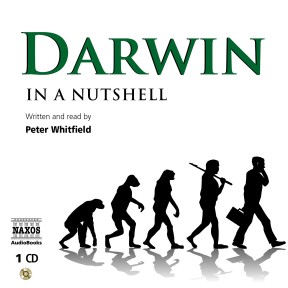
Audio Sample
Peter Whitfield
Darwin – In a Nutshell
Read by Peter Whitfield
unabridged
Naxos AudioBooks launches a new 1 CD introductory series In a Nutshell with Darwin, marking the 200th anniversary of the birth of the English naturalist. Peter Whitfield explains how Darwin came to his revolutionary views following his voyage on the Beagle – and his initial reluctance to publish his findings.
-
Running Time: 1 h 14 m
More product details
Digital ISBN: 978-962-954-836-0 Cat. no.: NA194412 Download size: 18 MB BISAC: BIO007000 Released: February 2009 -
Listen to this title at Audible.com↗Listen to this title at the Naxos Spoken Word Library↗
Due to copyright, this title is not currently available in your region.
You May Also Enjoy
Reviews
Peter Whitfield’s In a Nutshell: Darwin is exactly what it claims to be. In a little over an hour, Whitfield presents a biography of Charles Darwin and an overview of his life’s work. The “nutshell” part of the title may suggest that the production rushes through the facts, but that’s not the case. Whitfield has a pleasant voice, and the prose is smooth and interesting. The audio is a leisurely experience that can be likened to taking a walk while discussing Darwin and his theory of evolution. This is an hour well spent; listeners will learn much, after which they can decide whether or not to delve into the subject in more detail. Winner of AudioFile Earphones Award
S.D.D., AudioFile
A useful instant bicentenary guide, which gives you exactly what it says on the tin: family history, biography, succinct synopsis of what natural selection really means and what effect it had on the Victorian establishment. At the 1860 Oxford debate, Bishop Wilberforce asked Thomas Huxley, “Darwin”s bulldog”, if he was descended from apes on his father’s or his mother’s side. Vicious stuff, and it’s still raging.
Sue Arnold, The Guardian
I never knew that for 20 years Darwin suffered from a mysterious and debilitating condition that caused heart palpitations, nausea and stomach cramps. Was it chagas disease, picked up from South American beetles during his five-year Beagle voyage? Or purely psychosomatic, due to stress and dread of the negative reception his book would receive? Even his wife Emma was giving him stick about it. So he kept his head down and confined his theories to finches, turtles and moles, leaving humans out of the picture until his next bestseller, The Descent of Man, in 1871.
Author, poet, and historian Whitfield (Landmarks in Western Science) celebrates the 200th anniversary of Charles Darwin’s birth with this marvelous “nutshell” summary of the English naturalist’s life and his important contributions to science, reminding listeners of Darwin’s continued impact. The author himself narrates, his distinctly British reading conveying Darwin’s own British culture and his well-paced delivery helping to sustain interest. This title, one of many future “nutshell” works from this publisher to cover various other fields of study in a similarly cogent, succinct manner, serves as a useful introduction to Darwin’s life and work and nicely bookends the more comprehensive approach to audio learning offered by The Teaching Company and Recorded Books’ “Modern Scholar” series. Highly recommended.
Dale Farris, Groves
In a nutshell, this ‘nutshell’ audio production is great. Everyone can benefit from a Cliff Notes style review of what they studied in school. Whitfield provides a clear, straight-forward account of Charles Darwin and his theory of evolution. He concentrates on Darwin as a personality. Raised in an academic, upper-class, family, Darwin had many advantages as a young man and he didn’t squander them. Sober and reflective, he was also sensitive to the effect his ideas would have on the conventionally faithful, including his wife. Uninterested in being a firebrand, after his famous Galapagos Island trip, he happily returned to a quiet life at his country home where he refined his thoughts and theories. Still, they did rock the world and continue to be a source of controversy. They are also largely immutable. Whitfield narrates with warmth and precision.
Nancy Chaplin, SoundCommentary.com
Booklet Notes
Charles Darwin is one of the giants in the history of science. Along with Copernicus, Newton and Einstein, he taught us something fundamental about our world, and about the laws of nature. But Darwinism is involved particularly with our view of ourselves, with human origins and human identity. Darwin argued that the multitude of species now present has evolved over aeons of time from common ancestors, and that mankind is no exception; mankind is simply an advanced primate. When first announced in 1859, Darwin’s ideas were hugely controversial, for they seemed to strike at the heart of religious belief. Far from being created by God in a single divine act, all life’s forms – humans, animals and plants – had evolved, he claimed, from a single primitive type of organism. Darwin portrayed nature as working in obedience to blind impersonal laws, not in obedience to the hand of God. ‘The struggle for life’ and ‘the survival of the fittest’: these were the phrases that summed up the Darwinian vision. ‘Is man an ape or angel?’ people asked after reading Darwin; the scientists ranged up on one side and the traditionalists on the other.
Yet Darwinism also fed into the great 19th-century creed of progress. It seemed to suggest that mankind, having evolved from the apes, was now the summit of creation, and that it was his destiny to move forward to ever greater achievements, to intellectual mastery and social freedom. So Darwinism became one of the inspirations of positivism, humanism and socialism. It undermined one kind of faith and advanced another. It was a scientific theory which had enormous resonance outside the field of science itself. Even progressive Christians were able to accept evolution as part of a divine plan: it did not necessarily cut out God, because God could be working through evolution.
The man who conceived this profound and original theory was an enigma. Darwin’s face as seen in Victorian photographs is sad, heavy and almost tragic. He looks like a man weighed down by the burden of his own thought. His voyage around the world as a young man laid the foundations of one of the greatest intellectual adventures in history. In South America, Australia and the Pacific he observed the astonishing variety of animal and plant forms, so diverse and yet so obviously related to each other, and he became more and more convinced that ‘the species question’ was the supreme problem in biology. Yet after his return from the voyage, he became increasingly withdrawn and reclusive. After hammering out his theory over a period of several years in the early 1840s he concealed it for fifteen years because he feared the controversy and criticism that it would bring upon him. He began to suffer from a mysterious illness which may have been psychosomatic, his ideas having caused particular tension and disturbance in his mind. He lived very quietly in the country with his large family. He had a private fortune and never worked or held any official position throughout his life. He was scarcely a scientist at all in the modern sense – rather an amateur naturalist, an observer who thought deeply about what he saw. His theory of evolution was a great thought-experiment: it was a new way of looking at the things which had had always been there, but which no one else had noticed or understood. He was spurred into publishing his theory because he learnt that another naturalist, Alfred Russel Wallace, was working towards the same ideas.
Darwin’s book On the Origin of Species was finally published in 1859; it was a landmark not only of biological science but of human thought. Within it, however, Darwin did not directly discuss human evolution; instead he drew all his examples from the animal and plant world, because he was still extremely nervous about how his ideas would be received. In 1871, when the storm had died down, he published Descent of Man, in which he made plain that mankind must be considered as a part of the animal kingdom. He also showed how human instincts, morality and social behaviour can evolve, just as do physical forms.
In his own day Darwin’s theory remained just that: a theory. It could not be proved because science could not pinpoint any biological mechanism through which evolution could work: how could species change one into another, even over many generations? Only with the age of genetics did this mechanism reveal itself, and we now know that evolution works through random changes in genetic chemistry. It is a measure of Darwin’s genius that he was able to develop his ideas while knowing nothing of cellular biology, much less genetic mechanisms.
Darwin is one of the great innovators in scientific thought. His ideas might be seen as bleak, as shattering the old religious myths. Mankind has no divine creator in Darwinian thought, and no immortal soul: he is simply a part of the great processes of nature. But Darwin’s ideas may also be seen as positive: there is design and progress in nature, and mankind, with his higher intelligence and creativity, is a central part of it. Perhaps he is even destined to take control of his own evolution, as he has already begun to do through the science of genetics. The ideas of this reclusive Victorian naturalist resonate in so many intellectual fields, and it is for this reason that he remains a key figure in the history of our understanding of ourselves.
This CD presents a clear and lively account of Darwin’s life and ideas, bringing out the character of the man himself, and the intellectual excitement of his discoveries.
Notes by Peter Whitfield




